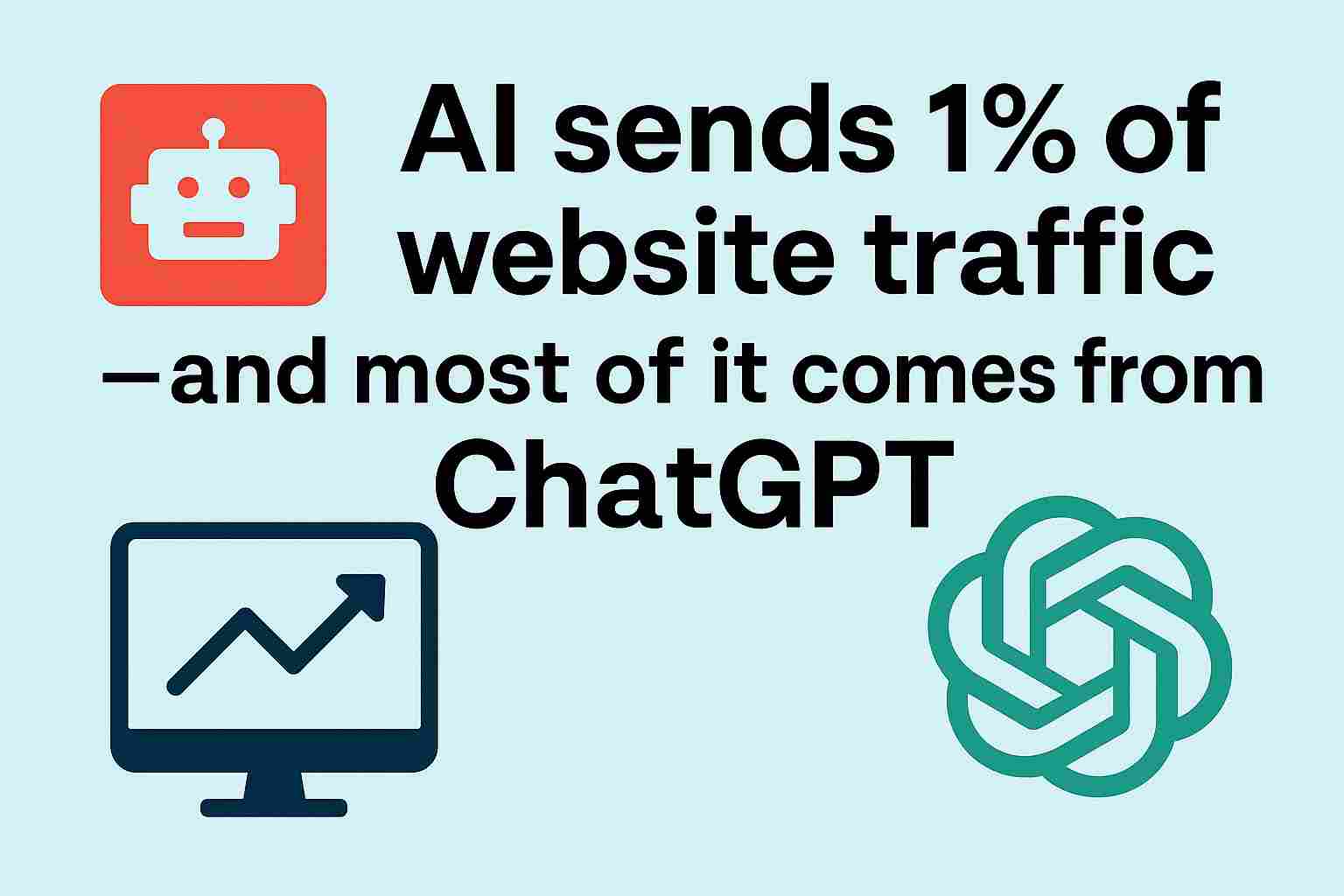Ever feel like the internet is slowly turning into one big AI conversation? You are not imagining it. A surprising trend has emerged across digital marketing: AI tools send only about 1 percent of total website traffic, and most of that tiny slice comes from ChatGPT. Not Google’s AI Overviews. Not Perplexity. Not Bing AI.
But why is this happening, and what does it mean for websites in 2025?
Let’s break it down in a simple and practical way.
Why does AI send only 1 percent of website traffic right now?
Even though AI tools are everywhere, users still rely heavily on Google Search, YouTube, and social feeds for actual clicking and visiting websites. AI assistants usually summarize answers instead of pushing users toward a website. That alone explains why AI-generated traffic is still very low.
Most users ask something, get the AI answer in a few seconds, and move on. Almost no one clicks through to a page. That is why the 1 percent number makes sense.
Why is ChatGPT responsible for most of that 1 percent?
Here is where it gets interesting.
When users do click from an AI tool, it is mostly from ChatGPT responses. Not from other AI platforms.
Reasons are simple:
ChatGPT provides long, detailed answers and often includes links within those answers
Users ask deeper questions here, not basic one-line queries
ChatGPT’s browsing mode sometimes shows real URLs
The tool behaves like a thinking partner, not a shortcut machine
Other AI tools rarely direct traffic. They summarize and stop.
As content strategist Rhea Thomas says, AI assistants give answers, but only a few encourage discovery. ChatGPT is one of those few.
Is this 1 percent traffic good or bad for website owners?
Honestly, it is a mix of both.
Good news:
If your site gets traffic from ChatGPT, it means your content is valuable, clear, and answer-worthy.
Not-so-good news:
AI might continue reducing overall clicks as more people rely on quick answers.
But there is a major opportunity hidden inside this shift.
Search is becoming AEO, also known as Answer Engine Optimization.
If your content is simple, direct, structured, and helpful, AI tools are more likely to reference you.
What can brands do to increase traffic from AI tools?
Here are practical steps that actually work:
Write clean, factual, helpful content that directly answers questions
Use Q and A formats, bullet points, and short definitions
Target natural long-tail questions instead of short keywords
Build topic authority with multiple articles in the same niche
Keep updating old content so AI sees it as fresh and reliable
What does the future look like for AI-driven traffic?
AI is becoming the first stop for answers, but not yet the final click.
Over the next two to three years:
AI may rise from 1 percent to 5 or even 10 percent traffic share
ChatGPT, Perplexity, and Google’s AI Overviews will compete harder
Websites with strong EEAT signals will win more AI citations
Traffic may shift from keyword search to conversational discovery
As AI researcher Daniel Morris says, traffic will not disappear. It will simply move into new pathways driven by conversational search.
The brands prepared for that shift will stay ahead.
FAQs
What is AI traffic?
AI traffic refers to visitors who land on your website from AI tools like ChatGPT, Perplexity, or AI Overviews.
Why doesn’t Google’s AI Overviews send much traffic?
Most users get their answer directly on the page and do not need to click through.
Is AI traffic more valuable?
Yes, AI-driven visitors are usually more engaged because they searched for a deeper, specific need.
Can optimizing for ChatGPT improve my rankings?
Yes. Conversational optimization improves SEO and helps AI pick your answers.
Will AI replace search engines?
No. Not anytime soon. People still rely on traditional search for verification and detailed research.
.Conclusion
AI may be sending only 1 percent of website traffic right now, but it is a powerful 1 percent. And because ChatGPT accounts for most of that, brands that adapt to conversational, clear, helpful content will be the ones who win in AI search.
If you have questions, thoughts, or ideas, feel free to share them. These discussions help businesses stay ahead.
Kumar Swamy is the CEO of Itech Manthra Pvt Ltd and a dedicated Article Writer and SEO Specialist. With a wealth of experience in crafting high-quality content, he focuses on technology, business, and current events, ensuring that readers receive timely and relevant insights.
As a technical SEO expert, Kumar Swamy employs effective strategies to optimize websites for search engines, boosting visibility and performance. Passionate about sharing knowledge, he aims to empower audiences with informative and engaging articles.
Connect with Kumar Swamy to explore the evolving landscape of content creation!
